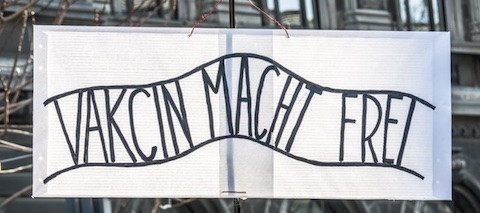
GCED Basic Search Form
Quick Search
You are here
News

Stefania Giannini, UNESCO Assistant Director-General for Education
Kathrin Meyer, Executive Secretary of the International Holocaust Remembrance Alliance (IHRA)
All around the world, opponents of COVID-19 measures invoke the genocide against the Jewish people by Nazi Germany and its collaborators to paint themselves as victims, and their governments as persecutorial regimes. In Germany, the United Kingdom, the Netherlands, the Czech Republic, France, Italy and the United States, protestors have engaged in falsifications of the history of the Holocaust, donning yellow star badges reading “not vaccinated” at demonstrations against COVID-19 measures. Until recently, such badges could be purchased on Amazon.
Such outrageous comparisons are clearly false, inappropriate and grossly offensive to the victims and survivors of the Holocaust. In many cases, Holocaust distortion serves as a bridge between mainstream and more radical ideas. It fans the flames of hate – of antisemitism, conspiracy myths, hate speech, science skepticism and distrust of democratic institutions, all of which have reached new heights during the pandemic.
The crimes of the Holocaust have been documented in detail by the German Nazi regime and its collaborators, repeated through eye-witness testimony and research by academics from around the world. Still, this history is abused, excused, misrepresented and manipulated: by governments who seek to minimize their historical responsibility, conspiracy theorists who accuse Jews for exaggerating their suffering for financial gain and online users who compare Nazi crimes with COVID-19 health regulations. Regardless of its form, Holocaust distortion always helps Holocaust denial, antisemitism, conspiracy myths and populism thrive.
Holocaust distortion can be found at all levels of society and is far from a fringe phenomenon. Often camouflaged as opinion, distortion is difficult to identify and frequently goes unchallenged. Nowhere is this clearer than online, where distortive memes and posts spread like wildfire, luring users down a rabbit hole of increasingly extremist content. Snarky comments or jokes making fun of the systematic persecution and murder of six million Jews desensitize people to the Holocaust and its legacy, and erode their understanding of established facts. This primes people for more radical points of view.
Social media platforms have pledged to take action against Holocaust denial. In an attempt to tackle this issue, Facebook has, for example, started to redirect users who search for Holocaust-related terms to the UNESCO and World Jewish Congress educational website AboutHolocaust.org. However, social media companies are struggling to propose measures that effectively respond to Holocaust distortion’s more coded messaging.
Holocaust distortion and its effects – antisemitism, Holocaust denial and extreme nationalism – are international in scope. It does not stop at national borders, nor is it found in only one language. Countering distortion therefore requires an international and interdisciplinary approach that bridges the gap between governments, experts, and civil society.
This approach must raise awareness of the dangers of Holocaust distortion. It must promote fact-based knowledge about the history of the Holocaust and strengthen media and information literacy.
This important work is starting to be undertaken. This week, global leaders are meeting in Malmö at the Remember – ReAct Forum to pledge concrete steps to further Holocaust remembrance and combat antisemitism. This landmark event comes over twenty years after the Stockholm Forum on the Holocaust laid the foundation for contemporary action on Holocaust education, remembrance and research. At a time when Holocaust distortion poses the greatest contemporary threat to this legacy, the International Holocaust Remembrance Alliance (IHRA) and UNESCO are jointly pledging to respond to Holocaust distortion through global advocacy, training, and education.
The IHRA and UNESCO are jointly launching a new program to develop trainings and resources to empower education professionals, policymakers, civil servants and journalists to address and prevent Holocaust distortion. This program complements recommendations which help policymakers recognize and counter Holocaust distortion, the Protect the Facts social media campaign, and the againstholocaustdistortion.org website launched earlier this year.
“We cannot stop our fight for the truth. We cannot sit quietly.”, IHRA Honorary Chairman Professor Yehuda Bauer said. “We have to do what we can. And what we can do is to teach, to research, to educate, to further our knowledge of what happened, so that similar things do not happen again.”
These efforts should not stop in classrooms. Each person has a responsibility to address Holocaust distortion and antisemitism, wherever they may encounter it. Everyone has a stake in understanding the accurate lessons of the Holocaust and standing up to hate today.
As leaders from around the world meet in Malmö this October, the IHRA–UNESCO program is a first step towards doing what we can, on an international and interdisciplinary scale, to counter Holocaust distortion. There is, however, much more work to be done.
URL:
https://en.unesco.org/news/rising-threat-holocaust-distortion-requires-urgent-international-response
